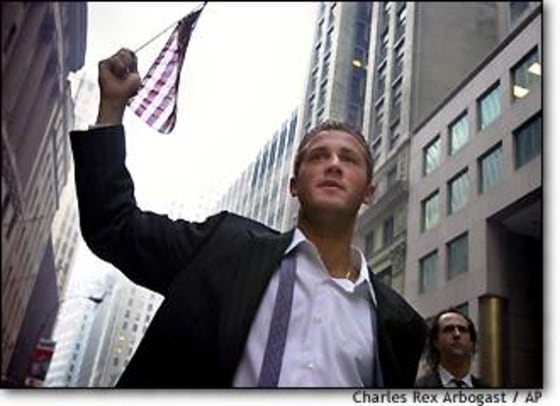This city’s psychological resilience, not just its commercial might, was evident Monday in the streets of Lower Manhattan as thousands of downtown workers poured into the financial district amid police cordons and military checkpoints. “It’s not about the money,” said Paul Orentlicher, a Wall Street architect who lost his best friend when terrorists leveled the World Trade Center towers last Tuesday. “I’m here to reclaim my life and to try to deal with what happened.”
On the day the New York Stock Exchange re-opened for business for the first time since Sept.11, Orentlicher’s feelings seemed unanimous among white- and blue-collar workers alike, more as a demonstration of spirited faith than as a show of bravado.
“Forget about the money,” said Hasmukh Patel, 52, who operates the newsstand at Williams and Wall Streets, where soldiers manned the largest checkpoint allowing traders to enter the Stock Exchange. “It’s life that’s important. I feel so bad. I’m so upset right now.”
Perhaps the most potent symbol of the day, which began under skies as blue and cloudless as the day of the terrorist attack, was the huge American flag that draped the facade of the exchange.
Equally powerful, however, was the sight of a New York City police officer wearing a respirator, with a German shepherd at his side, standing guard together high on a rampart across from the exchange at Federal Hall, where George Washington was inaugurated in 1789 as the first president of the United States.
‘Like a foreign landscape'
The New York subway system was running, and the morning rush hour appeared normal — although several downtown stations in and around the financial district were closed to avoid creating vibrations beneath the rescue and recovery site at Ground Zero. Except for trains switching tracks — some expresses ran on local tracks and some locals ran on express tracks — commuters within Manhattan didn’t appear to have much problem getting to work.
“People are talking to each other in the subway — I haven’t seen that in 30 years,” said Stephen Weiner, 67, an attorney for Pillsbury Winthrop, who was headed to his office at Battery Park Plaza.
Orentlicher, 40, who works for Skidmore, Owings & Merrill, at 14 Wall St., wasn’t planning to come to work this morning. “But I felt the need to be with my friends in the office. It has absolutely nothing to do with money,” he said.
Reclaiming a sense of normalcy will be difficult for him, he added, because his best friend and deskmate, Arkady Zaltsman, hasn’t been heard from since Tuesday morning. “He was at a meeting on the 105th floor of Tower Two” when the World Trade Center collapsed, Orentlicher said. “Everything looks completely foreign — the smoke, the dust, the police, the soldiers. It looks like a foreign landscape.”
‘Getting back to... normal'
On New Street, a narrow thoroughfare behind the Stock Exchange, many retail stores were closed — including a Dunkin’ Donuts and a Kentucky Fried Chicken — their windows layered with gray dust.
But the Blue Chip Unisex Salon was open. “We can’t be closed,” said Alex Babayev, 30, who owns the barbershop. “The phone is ringing. Clients are already calling. People are coming.” If they were, they didn’t seem to be in a hurry. The shop had one customer. Four of the five chairs were empty. The barbers were sweeping up rather than cutting hair, and the phone rang only once.
“I can’t imagine how anybody’s going to make money on this, ” said Adam Sati, 30, a stock trader at Heartland Securities, who was heading up Broad Street toward his office. “I’m here just to get it over with. I wasn’t sure how I would feel. For some people it’s the money. But for a lot of us, it’s about getting back to a normal life.”
Despite the many American flags that hung out of office windows, the patriotism on display felt like the quiet pride of civilized people going about their business. Jingoistic sentiment did not seem part of the agenda. Soldiers and police officers at various checkpoints, mobbed by the media, dealt firmly yet politely with the crowds in the street. And Red Cross workers handed out leaflets about how to deal with shock, fear, grief and survivor guilt, which were described as the most common reactions to the tragedy.
Comfort stations
Two health clubs across the street from the Stock Exchange — Equinox, at 14 Wall St., and the New York Sports Club, at 30 Wall — both offered comfort to passers-by. “Complimentary Bagels and Coffee,” said the hand-lettered Equinox sign. “Showers Available, Men’s Women’s Toilets,” the sign at the Sports Club noted.
“It’s symbolic,” said Alex Mass, 35, the maintenance manager of the Equinox club, glancing toward rows of idle exercise machines. “We’re not really open until tomorrow for regular business. We just want to show that we’re not standing down.”
Further from Ground Zero, on Whitehall Street near Bowling Green, the New York Health and Racquet Club had gone beyond symbolic. For several days it has been providing food, clothing, showers, massages and rest space for rescue workers and displaced residents.
Jan Herman is a senior editor-producer at MSNBC.com.
